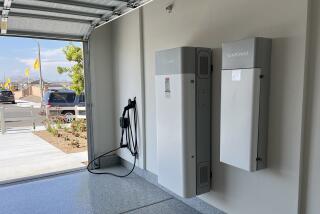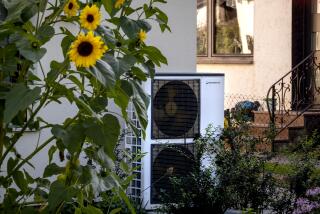More energy-efficient TV boxes saved about $168 million, industry says
Consumers saved an estimated $168 million in electricity last year as a result of improved efficiency of television set-top boxes, the industry said in a report released this week.
The report was the first annual estimate of the industry’s performance on a voluntary agreement to reduce the power-hungry device’s use of electricity.
The electrical output of more than four nuclear power plants is needed around the clock to keep set-top boxes operating in tens of millions of homes, according to estimates by government and private groups.
Set-top boxes, which connect TVs to cable and satellite signals, are one of the largest consumers of electricity in many homes, including those that have multiple boxes equipped with digital recording devices. In the worst case, a single box can consume more power on an annual basis than a new energy-efficient refrigerator.
Facing possible government regulation, two major trade associations that represent the electronics and the cable industries — the National Cable and Telecommunications Assn. and the Consumer Electronics Assn. — agreed to voluntarily reduce the amount of power set-top boxes consume.
The deal eventually is supposed to save consumers $1 billion annually in electricity.
“These collective efforts of the cable, satellite and telephone industries demonstrate a commitment to delivering innovative video services while, at the same time, saving energy in our customers’ homes,” said Michael Powell, the cable association president.
But consumer advocates criticized the industry’s progress as too slow.
“The voluntary agreement is grossly inadequate,” said Mark Cooper, research director at the Consumer Federation of America. “The fact that they are limping along to a ridiculously low target underscores how important it is for California to impose aggressive and responsible standards.”
Doug Johnson, vice president of technology policy at the Consumer Electronics Assn., said the consumer group “appears devoted to a regulatory approach that others recognize as inappropriate for rapidly evolving, high-tech devices and networked systems.”
The California Energy Commission, which has a long history of imposing appliance standards that later become adopted across the nation, was not a party to the agreement and continues to monitor the situation. It has not ruled out imposing standards of its own.
Cooper noted that the $168 million in estimated savings the first year means it could take a long time before the goal of $1 billion in annual savings is reached.
The agreement was also signed by the Natural Resources Defense Council, which has argued the agreement yielded energy savings more quickly than mandatory standards. The NRDC aligned itself with one of the most powerful corporate sectors in America and in opposition to consumer advocates.
The report shows that 80% of set-top boxes with internal digital recorders are still older generation devices.
Nonetheless, the report said, the devices have already achieved significant reductions on national energy consumption. It noted that software downloads have allowed 14.3 million boxes to go into a sleep mode that reduces power use.
In the past, the boxes typically drew as much when switched off as when they were in use.
More to Read
Start your day right
Sign up for Essential California for news, features and recommendations from the L.A. Times and beyond in your inbox six days a week.
You may occasionally receive promotional content from the Los Angeles Times.







